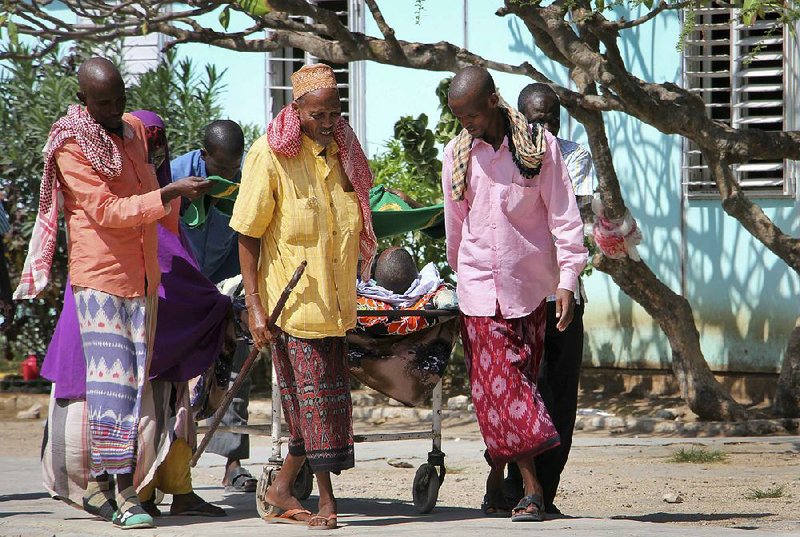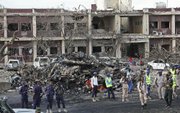MOGADISHU, Somalia -- The two truck bombs that detonated Saturday in Somalia's capital killed 276 people and injured about 300 others, the country's information minister said early today, making it the deadliest single attack in the Horn of Africa nation.
The death toll jumped after dozens of bodies were recovered from the rubble and after some of the wounded died from their injuries. The number of dead is expected to rise.
The first explosion occurred at a major city intersection normally packed with cars, buses and taxis, where hotels, stores, restaurants and government buildings cater to locals.
Before detonating the truck he was driving, the suicide bomber raced along a Mogadishu street at high speed, rolling over motorcycles and cars and striking some vehicles stuck in traffic. Security forces opened fire on the truck but did not shoot the driver.
Nearly all of the dead were killed by the first bomb, which exploded Saturday outside a popular hotel near a busy intersection in Mogadishu, sending a plume of smoke into the sky that could be seen across the city. The second truck bomb killed several more people nearby.
In a tweet, Abdirahman Osman called the attack "barbaric" and said countries including Turkey and Kenya had already offered to send medical aid. Hospitals were overwhelmed a day after a truck bomb targeted the crowded street near key government ministries, including foreign affairs.
As angry protesters gathered near the scene of the attack, Somalia's government blamed the al-Qaida-linked al-Shabab extremist group for what it called a "national disaster." However, Africa's deadliest Islamic extremist group, which often targets high-profile areas of the capital, had yet to comment.
Al-Shabab earlier this year vowed to step up attacks after both U.S. President Donald Trump's administration and Somalia's recently elected president announced new military efforts against the group.
The Mogadishu bombing is one of the deadliest attacks in sub-Saharan Africa, larger than the Garissa University attack in Kenya in 2015 and the U.S. Embassy bombings in Kenya and Tanzania in 1998.
"The barbaric attack points to a trend in which areas known for vibrant activity and thriving businesses are targeted," the African Union Mission in Somalia said in an emailed statement. "The cowardly act attests to the deliberate effort by Al-Shabaab to deter progress being made by hardworking Somalis to stabilize their country."
The African Union urged the international community to support a "more coordinated and robust international support" to Somalia's institutions in their fight against extremist groups.
"It is now clear that without adequate and appropriate support to Somalia, many of the security gains made in recent years could be reversed," it said in a statement.
Doctors at Mogadishu hospitals struggled to assist badly wounded victims, many burned beyond recognition. "This is really horrendous, unlike any other time in the past," said Dr. Mohamed Yusuf, the director of Medina hospital.
Inside, bleary-eyed nurses transported a man whose legs had been blown off. He waited as surgeons attended to another badly injured patient. Exhausted doctors struggled to keep their eyes open, while screams from victims and newly bereaved families echoed through the halls.
"Nearly all of the wounded victims have serious wounds," said nurse Samir Abdi. "Unspeakable horrors."
A teary-eyed Hawo Yusuf looked at her husband's badly burned body. "He may die waiting," she said. "We need help."
Ambulance sirens echoed across the city as bewildered families wandered in the rubble of buildings, looking for missing relatives. "In our 10-year experience as the first responder in #Mogadishu, we haven't seen anything like this," the Aamin Ambulance service tweeted.
Grief overwhelmed many.
"There's nothing I can say. We have lost everything," wept Zainab Sharif, a mother of four who lost her husband. She sat outside a hospital where he was pronounced dead after hours of efforts by doctors to save him.
The country's Somali-American leader, President Mohamed Abdullahi Mohamed, declared three days of mourning and joined thousands of people who responded to a desperate plea by hospitals to donate blood. "I am appealing all Somali people to come forward and donate," he said.
The Qatari Embassy was severely damaged in the explosion, the country's Ministry of Foreign Affairs said in a statement, adding that the charge d'affaires had been slightly injured.
The British ambassador to Somalia, David Concar, said on Twitter that the blast had been clearly audible from inside the British Embassy.
He also wrote: "Such cruel, cowardly acts. My condolences to the families and friends of the killed and injured, and to all Somalis. A time for unity and resolve."
Mogadishu, a city long accustomed to deadly bombings by al-Shabab, was stunned by the force of Saturday's blast. The explosion shattered hopes of recovery in an impoverished country left fragile by decades of conflict, and it again raised doubts over the government's ability to secure the seaside city of more than 2 million people.
"They don't care about the lives of Somali people, mothers, fathers and children," Prime Minister Hassan Ali Khaire said of the attackers. "They have targeted the most populated area in Mogadishu, killing only civilians."
Rescue workers searched for survivors trapped under the rubble of the largely destroyed Safari Hotel, which is close to Somalia's Foreign Ministry. The explosion blew off metal gates and blast walls erected outside the hotel.
The United States condemned the bombing, saying "such cowardly attacks reinvigorate the commitment of the United States to assist our Somali and African Union partners to combat the scourge of terrorism." It tweeted a photo of its charge d'affaires in Somalia donating blood.
But the U.S. Africa Command said U.S. forces had not been asked to provide aid. A spokesman said first responders and local officials would handle the response and that "the U.S. would offer assistance if and when a request was made."
The U.S. military has stepped up drone strikes and other efforts this year against al-Shabab, which is also fighting the Somali military and over 20,000 African Union forces in the country.
The United Nations special envoy to Somalia called the attack "revolting," saying an unprecedented number of civilians had been killed. Michael Keating said the U.N. and African Union were supporting the Somali government's response with "logistical support, medical supplies and expertise."
In a tweet, U.N. Secretary-General Antonio Guterres said he was "sickened" by the attack, and his spokesman urged all Somalis to unite against extremism and work together to build a "functional" federal state.
Saturday's blast occurred two days after the head of the U.S. Africa Command was in Mogadishu to meet with Somalia's president, and two days after the country's defense minister and army chief resigned for undisclosed reasons.
Amid the chaos, the stories of victims began to emerge. Amino Ahmed said one of her friends, a female medical student, was killed on the eve of her graduation. The explosion also killed a couple returning from a hospital after having their first child, said Dahir Amin Jesow, a Somali lawmaker.
"It's a dark day for us," he said.
Information for this article was contributed by Abdi Guled and Mohamed Sheikh Nor of The Associated Press; by Kevin Sieff and Abdullahi Mire of The Washington Post; by Hussein Mohamed and Mohamed Ibrahim of The New York Times; by Mohamed Sheikh Nor of Bloomberg News; and by Mohamed Odowa of Tribune News Service.
A Section on 10/16/2017


